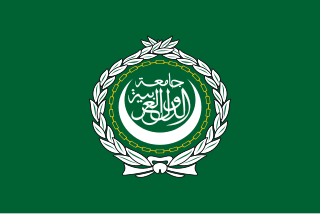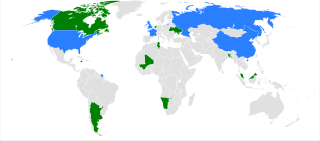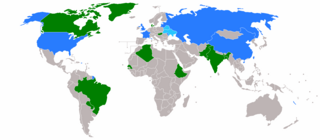| |||
5 (of 10) non-permanent seats on the United Nations Security Council | |||
Security Council after 2009 elections. | |||
| |||
The 2009 United Nations Security Council election was held on 15 October 2009 during the 64th session of the United Nations General Assembly, held at United Nations Headquarters in New York City. The election was for five non-permanent seats on the UN Security Council to serve two-year mandates commencing on 1 January 2010.

The United Nations (UN) is an intergovernmental organization that was tasked to maintain international peace and security, develop friendly relations among nations, achieve international co-operation and be a centre for harmonizing the actions of nations. The headquarters of the UN is in Manhattan, New York City, and is subject to extraterritoriality. Further main offices are situated in Geneva, Nairobi, and Vienna. The organization is financed by assessed and voluntary contributions from its member states. Its objectives include maintaining international peace and security, protecting human rights, delivering humanitarian aid, promoting sustainable development and upholding international law. The UN is the largest, most familiar, most internationally represented and most powerful intergovernmental organization in the world. In 24 October 1945, at the end of World War II, the organization was established with the aim of preventing future wars. At its founding, the UN had 51 member states; there are now 193. The UN is the successor of the ineffective League of Nations.

The United Nations General Assembly is one of the six principal organs of the United Nations (UN), the only one in which all member nations have equal representation, and the main deliberative, policy-making, and representative organ of the UN. Its powers are to oversee the budget of the UN, appoint the non-permanent members to the Security Council, appoint the Secretary-General of the United Nations, receive reports from other parts of the UN, and make recommendations in the form of General Assembly Resolutions. It has also established numerous subsidiary organs.

The City of New York, usually called either New York City (NYC) or simply New York (NY), is the most populous city in the United States and in the U.S. state of New York. With an estimated 2017 population of 8,622,698 distributed over a land area of about 302.6 square miles (784 km2), New York is also the most densely populated major city in the United States. Located at the southern tip of the state of New York, the city is the center of the New York metropolitan area, the largest metropolitan area in the world by urban landmass and one of the world's most populous megacities, with an estimated 20,320,876 people in its 2017 Metropolitan Statistical Area and 23,876,155 residents in its Combined Statistical Area. A global power city, New York City has been described as the cultural, financial, and media capital of the world, and exerts a significant impact upon commerce, entertainment, research, technology, education, politics, tourism, art, fashion, and sports. The city's fast pace has inspired the term New York minute. Home to the headquarters of the United Nations, New York is an important center for international diplomacy.
In accordance with the Security Council's rotation rules, whereby the ten non-permanent UNSC seats rotate among the various regional blocs into which UN member states traditionally divide themselves for voting and representation purposes, the five available seats were allocated as follows:

The United Nations Regional Groups are the geopolitical regional groups of the Member States of the United Nations. Originally, United Nations Member States were unofficially grouped into five geopolitical regional groups. However, what began as an informal means of sharing the distribution of posts for United Nations bodies quickly took on a much more expansive role. Depending on the context, the regional groups control elections to United Nations-related positions, on the basis of geographic representation, as well as coordinate substantive policy, and form common fronts for negotiations and voting.
- Two for Africa (previously held by Burkina Faso and Libya)
- One for Asia (previously held by Vietnam)
- One for Eastern Europe (previously held by Croatia)
- One for Latin America and the Caribbean (previously held by Costa Rica)

The following is an alphabetical list of subregions in the United Nations geoscheme for Africa, used by the UN and maintained by the UNSD department for statistical purposes.

Burkina Faso is a landlocked country in West Africa. It covers an area of around 274,200 square kilometres (105,900 sq mi) and is surrounded by six countries: Mali to the north; Niger to the east; Benin to the southeast; Togo and Ghana to the south; and Ivory Coast to the southwest. The July 2018 population estimate by the United Nations was 19,751,651. Burkina Faso is a francophone country, with French as the official language of government and business. Roughly 40% of the population speaks the Mossi language. Formerly called the Republic of Upper Volta (1958–1984), the country was renamed "Burkina Faso" on 4 August 1984 by then-President Thomas Sankara. Its citizens are known as Burkinabé. Its capital is Ouagadougou.

Libya, officially the State of Libya, is a country in the Maghreb region in North Africa, bordered by the Mediterranean Sea to the north, Egypt to the east, Sudan to the southeast, Chad to the south, Niger to the southwest, Algeria to the west, and Tunisia to the northwest. The sovereign state is made of three historical regions: Tripolitania, Fezzan and Cyrenaica. With an area of almost 1.8 million square kilometres (700,000 sq mi), Libya is the fourth largest country in Africa, and is the 16th largest country in the world. Libya has the 10th-largest proven oil reserves of any country in the world. The largest city and capital, Tripoli, is located in western Libya and contains over one million of Libya's six million people. The second-largest city is Benghazi, which is located in eastern Libya.
Nigeria was expected to run unopposed for a 2010–11 seat, but unexpectedly faced competition from Sierra Leone. [1] Nigeria has already served thrice in the UNSC, while Sierra Leone served only once. [2] Sierra Leone did not contest the seat, however. Instead, Gabon ran for the second seat.

The Federal Republic of Nigeria, commonly referred to as Nigeria, is a federal republic in West Africa, bordering Niger in the north, Chad in the northeast, Cameroon in the east, and Benin in the west. Its coast in the south is located on the Gulf of Guinea in the Atlantic Ocean. The federation comprises 36 states and 1 Federal Capital Territory, where the capital, Abuja is located. Nigeria is officially a democratic secular country.

Sierra Leone, officially the Republic of Sierra Leone, informally Salone, is a country on the southwest coast of West Africa. It has a tropical climate, with a diverse environment ranging from savanna to rainforests. The country has a total area of 71,740 km2 (27,699 sq mi) and a population of 7,075,641 as of the 2015 census. Sierra Leone is a constitutional republic with a directly elected president and a unicameral legislature. The country's capital and largest city is Freetown. Sierra Leone is made up of five administrative regions: the Northern Province, North West Province, Eastern Province, Southern Province and the Western Area. These regions are subdivided into sixteen districts.

Gabon, officially the Gabonese Republic, is a country on the west coast of Central Africa. Located on the equator, Gabon is bordered by Equatorial Guinea to the northwest, Cameroon to the north, the Republic of the Congo on the east and south, and the Gulf of Guinea to the west. It has an area of nearly 270,000 square kilometres (100,000 sq mi) and its population is estimated at 2 million people. Its capital and largest city is Libreville.
Bosnia and Herzegovina was the only candidate country for the Eastern European group seat, as Poland withdrew its candidacy in order to give a strong support to the new Bosnian statehood. Poland then gave its support to Bosnia and Herzegovina and invited "all the countries which have already given their support to Polish candidacy, to back-up Bosnia and Herzegovina becoming a member of the UN Security Council." [3] Serbia announced its plans to run for the Eastern Europe seat. [4]

Bosnia and Herzegovina, sometimes called Bosnia–Herzegovina, and often known informally as Bosnia, is a country in Southeastern Europe, located within the Balkan Peninsula. Sarajevo is the capital and largest city.

Poland, officially the Republic of Poland, is a country located in Central Europe. It is divided into 16 administrative subdivisions, covering an area of 312,696 square kilometres (120,733 sq mi), and has a largely temperate seasonal climate. With a population of approximately 38.5 million people, Poland is the sixth most populous member state of the European Union. Poland's capital and largest metropolis is Warsaw. Other major cities include Kraków, Łódź, Wrocław, Poznań, Gdańsk, and Szczecin.

Serbia, officially the Republic of Serbia, is a country situated at the crossroads of Central and Southeast Europe in the southern Pannonian Plain and the central Balkans. The sovereign state borders Hungary to the north, Romania to the northeast, Bulgaria to the southeast, North Macedonia to the south, Croatia and Bosnia and Herzegovina to the west, and Montenegro to the southwest. The country claims a border with Albania through the disputed territory of Kosovo. Serbia's population is about seven million. Its capital, Belgrade, ranks among the oldest and largest citiеs in southeastern Europe.
As Libya's term was ending, the new Arab representative would come from the Asian Group. One of the eleven Arab League member states in Asia would therefore succeed to Vietnam's seat in this election. Lebanon announced its intention to obtain this seat.

The Arab League, formally the League of Arab States, is a regional organization of Arab states in and around North Africa, the Horn of Africa and Arabia. It was formed in Cairo on 22 March 1945 with six members: Egypt, Iraq, Transjordan, Lebanon, Saudi Arabia, and Syria. Yemen joined as a member on 5 May 1945. Currently, the League has 22 members, but Syria's participation has been suspended since November 2011, as a consequence of government repression during the Syrian Civil War.

Lebanon, officially known as the Lebanese Republic, is a country in Western Asia. It is bordered by Syria to the north and east and Israel to the south, while Cyprus is west across the Mediterranean Sea. Lebanon's location at the crossroads of the Mediterranean Basin and the Arabian hinterland facilitated its rich history and shaped a cultural identity of religious and ethnic diversity. At just 10,452 km2, it is the smallest recognized sovereign state on the mainland Asian continent.
Brazil sought to replace Costa Rica.
















